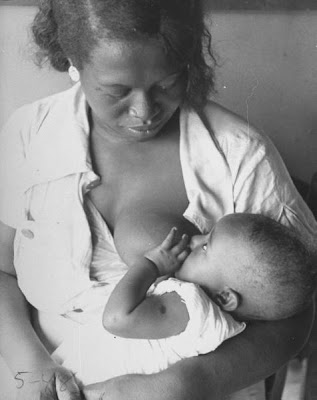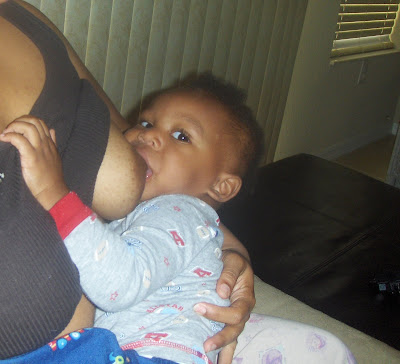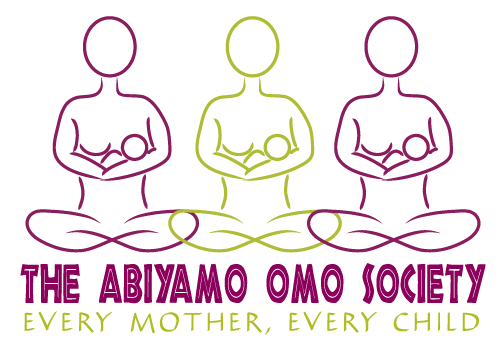
BREASTFEEDING
WHILE BLACK
__________________________
Wednesday, April 8, 2009
Stick To It:
Lessons On How
To Keep Breastfeeding,
Despite The Odds

By ELITA KALMA
When my son was born, I was told he needed formula because he had low blood sugar and jaundice, and for five hours, he was stuffed with the artificial milk, despite my pleas that he be brought to me so that I could nurse him. I was the one with the good stuff—colostrum, that early sugar milk brimming with antibodies. But I was scared for the welfare of my son, and too exhausted to fight the power. And by the time my baby finally was brought to me, my nurse, a sistah, was, let’s say, less than encouraging. She took one look at my breasts and declared, “You have terrible nipples—you’ll never be able to nurse!” Then she roughly shoved my boob into my baby’s mouth.
That was the beginning of my breastfeeding journey.
On my way out the hospital door, a nurse practically forced a diaper bag full of formula on me, insisting that my son would need it if he got hungry—as if my always available, always sterile, always-full-of-just-enough milk breasts just wouldn’t do. My discharge papers revealed that my son had been supplemented with formula every time he left my sight!
Lucky for us, this early introduction of artificial nipples and formula didn’t ruin our breastfeeding relationship; my son has been breastfeeding for 16 months now, with no signs of letting up. But there are plenty of moms and babies who aren’t as fortunate. Although our breastfeeding initiation rate is currently at an all-time high (about 60% of black moms are nursing when they leave the hospital), only a paltry 30% are still nursing at six months and only about 12% at one year. Our society has set moms up for failure, often starting from day one. If the nurses aren’t shoving a bottle full of formula down your baby’s throat, we’re often forced to run a gauntlet of well-meaning friends and family who don't know much about nursing and offer bad—and often discouraging—advice.
And don’t get me started on nursing in public! It's as if people expect a breastfeeding mother to never leave the house! Women are so scared of other people's reactions that they hide in bathrooms or their cars or give the baby a bottle to avoid breastfeeding in a public place. You have the legal right to breastfeed your baby in public but sometimes you wouldn't know it! I have nursed my son everywhere: Target, restaurants, my in-laws’ home, the mall. I will whip out a boob to feed my child whenever and wherever necessary. Some people won’t like it and you may get looks or worse. I was asked to cover up in a hotel lobby by a teacher chaperoning a high school field trip. I pretty much had to tell her where to go and how to get there!
I say all of this not to discourage you from nursing, but to encourage you to work through the obstacles because it is so worth it. Breast milk is a living, changing organism designed expressly for your baby. The bond you create with your child when you nurse him is unmatched. There are a million reasons to breastfeed, and for black babies especially, breast milk saves lives. Did you know that 8,000 black babies die before their first birthday in this country—triple the rate of white babies. Did you know that diseases and ailments that plague the black community, like breast cancer, ovarian cancer, diabetes, and obesity, are prevented or lessened if you breastfeed and were breastfed?
I know that it is more difficult for black women to breastfeed. Often we don’t have the jobs with the flexibility needed to continue breastfeeding. Our partners aren’t supportive. Our families think of breastfeeding as something weird that only white women do. Our bodies have been so hypersexualized in music and the media that we think our breasts can only serve one purpose. It's a disgrace that if you want to breastfeed it takes a mix of good luck and tenacity. If we, as a nation, a world, a community, want women to breastfeed, want our babies to be healthier, then we have to truly start supporting them. That means fewer unnecessary medical interventions during childbirth, longer and paid parental leave, on-site daycare, laws requiring employers to give women breaks for pumping/nursing, and normalization and acceptance of breastfeeding in public.
Then, and only then, will we see women doing what the American Academy of Pediatrics and World Health Organization recommend: exclusive breastfeeding for the first six months, and nursing until age 1 and beyond.So if you are pregnant, take the time to learn as much as you can about breastfeeding. Read Kathi Barber’s The Black Woman’s Guide to Breastfeeding. Create a birth plan before you go to the hospital, spelling out your wishes for both labor AND breastfeeding. Talk to your friends who have nursed and ask for advice. Call the African-American Breastfeeding Alliance or your hospital’s lactation “warm line” at the first sign of difficulty. Bookmark http://www.KellyMom.com.
And of course, you can always contact me. I think I’ve become a bit of a pro! Breastfeeding is seriously one of the most amazing things I've ever done in my entire life. Snuggling my son close while he stares at me with those big brown eyes?
There is nothing better.
About our MyBrownBaby contributor: Elita Kalma is a librarian and the mother to 16-month-old Miles, who is still nursing. She blogs about breastfeeding at The Blacktating Blog and can be found on Twitter @blacktating.
If you would like to be a MyBrownBaby contributor, email your essays/ideas to Denene at denenemillner at gmail dot com.
__________________________
February 2012
Breastfeeding Mother of Color
of the Month:
Elita Kalma
Posted by The Abiyamo Omo Society
>via: http://abiyamoomosociety.blogspot.com/2012/02/february-2012-breastfeeding-mot...
__________________________
By Andrea Plaid
When it comes to motherhood, Black cisgender women are boxed into a variation of the Madonna/whore dichotomy: the sexless Mammy who loves and feeds, literally and figuratively, almost everyone else, and the Welfare Mother, whose “pathologically loose values” leaves her with children by different fathers and on the government dole. Even our nursing bosoms get caught in this public debate: we see images of Black women breastfeeding white infants, National Geographic-style exoticizing of African women breastfeeding their children, the public side-eyeing via questions of why Black women don’t use the milk Nature provides to give their children the best physical and mental advantages from the start.
Thankfully, Black breastfeeding activists–or “lactivists”–like Elita Kalma step in on the regular and disrupt this dichotomy. I’ve been loving her tweets for a while, and I dig her excellent blog, Blacktating. And other folks dig what she says and does:according to the site, “Elita has been featured in the book, Does This Pregnancy Make Me Look Fat?”, works with Dr. Kathleen Arcaro on her groundbreaking breastmilk and breast cancer research, and has been a featured guest blogger on theSouth Florida Sun-Sentinel parenting blog, “Moms & Dads,” the Motherwear Breastfeeding Blog, and My Brown Baby.”
So, being the curiously crushing-out soul that I am, I just had to interview Kalma about her activism, those aforementioned images, racism and solidarity within lactivist communities, and Beyonce.
A bit about you: where you’re from and your profession. Also, when and how did you become a breastfeeding activist?
I’m a librarian who lives in Ft. Lauderdale, FL. I lived in NYC for a few years so I really feel like a Queens girl at heart. I became a breastfeeding activist (or lactivist, as we call ourselves) after the birth of my son in 2007. I found myself so fascinated with breastfeeding since I was always doing it. I was thinking about it and talking about so much I decided to start my blog because I was sure my husband, family and friends were sick of listening to me go on about breastfeeding all of the time.
What are the prevailing popular images when it comes to Black women and breastfeeding? Do you seeing the image(s) changing?
Well, even just a few years ago it was really hard to find photos of modern-looking black women breastfeeding. It was all African/tribal women or really dated photos from old WIC campaigns. That’s definitely changing. More and more companies are using black women as models to sell breastfeeding accessories. The United States Breastfeeding Committee received funding to produce images of breastfeeding to be put in the public domain, and one of the recipients of that funding was the Indiana Black Breastfeeding Coalition. They created this amazing gallery of over 200 photos of black women breastfeeding that is so diverse. There are photos of moms breastfeeding babies and toddlers, many out in public. I love that the photos include partners and grandmas and siblings, because breastfeeding really is a family affair. It’s just a beautiful collection and those images have ended up in several breastfeeding campaigns and blogs.
One image that’s been appearing nowadays that causes a bit of discomfort is seeing a Black woman feeding a white
child or, more disconcerting, a Black breast feeding a white child. It brings up for some the Mammy stereotype and the traumatic history of Black enslaved women who served as wet nurses for children, both the ones fathered by their white slaveholder and those who were fathered by their Black partners. Thoughts on that?
I find those images really to be really gross, and I find the defending of those images as beautiful by some white lactivists to be really problematic. With our legacy of slavery in this country, I just don’t see how anyone can look at those photos and like them. There are just too many issues of race, class, and power wrapped up in the nursing of a white child by a black woman for me to find any beauty there.
I know that you, for the most part, have mostly praised Beyonce for breastfeeding in public and called it a Black breastfeeding moment. Yet, your praise received borderline racist responses. In your post, you said that “I can’t help but think that race is playing a part in the attitudes and responses from moms I’ve seen online.” Would you mind discussing how race and racism plays out among breastfeeding advocates? Do you get support from other lactivists of color?
I get boatloads of support from other lactivists of color. I think we support each other’s endeavors all of the time. They link to my writing, and I post about their events. What happens is that when the topic of breastfeeding rates comes up, everyone wants to shake their heads and tsk-tsk at the low initiation rates amongst black women. But when the world’s biggest superstar, who happens to be black, breastfeeds the response from many white women was, “What does race matter? Shouldn’t she just be celebrated as a nursing mom?” Well, no. It’s a huge deal that the most A-list celebrity mom to breastfeed to date and sing its praises in a major magazine was black. Some people wanted to downplay the significance which I found interesting. If she’d decided to formula feed, I am for sure that the story would have been that was expected, since black women don’t breastfeed as much.
Do you think the images (or lack thereof) of Black women and breastfeeding in pop culture further feeds into the media-driven “Mommy Wars?” Why or why not?
I think that, like with other aspects of mothering, black women have been saying for a long time, “Hey, why aren’t we being included in this conversation?” I think that’s a separate issue from the so-called “Mommy Wars” though.
Just caught your Twitterfeed about wanting to hear happy breastfeeding stories. Maybe it’s just me, but I can’t help but wonder if these negative stories about breastfeeding are a pushback to women essentially making a protesting stand on using their breasts for feeding when this society shows again (and again and again!) that breasts are there just to attract sexual/romantic attention?
I really think the pushback is that many women believe breastfeeding is going to be easy because it’s a natural process and then when they face challenges they say, “Why didn’t anyone tell me?” I think a lot of women have the expectation that breastfeeding will be amazing and transformative, and it is for so many. But when they don’t get that experience they feel angry, and in some cases guilty, especially if they weren’t able to do it for very long. And I think in general there is the feeling that if you had a great breastfeeding experience or a great birth that you can’t talk about it because people will think you’re being a “sanctimommy.” It’s become perfectly acceptable to bash breastfeeding, but if you sing its praises you’re automatically a breastfeeding bully. The reality is that it will be difficult for some and easy for others, and both of those experiences are valid. Particularly in a culture that doesn’t support breastfeeding in general, I think moms who make it work deserve all the kudos.
Gotta ask: your thoughts about NYC’s Mayor Bloomberg restricting hospital baby formulas to encourage breastfeeding and how that may play out along racial lines?
Well, first, I think there was a lot of drama surrounding that initiative that was really silly. I wonder how many people who had something to say about it actually read what the Latch On NYC campaign was all about. All of the evidence we have shows that when breastfeeding is supported in the hospital and formula freebies aren’t handed out, the breastfeeding rates go up. Harlem Hospital was the first hospital in New York City to be certified as Baby Friendly by UNICEF in 2008. The overall breastfeeding initiation rate for black women is about 54%, but 81% of women are breastfeeding when they leave Harlem Hospital. In California, the difference in breastfeeding rates for black women at regular hospitals versus Baby Friendly was 40% versus 60%. We know that training nurses to not reach for formula first and not allowing the formula companies carte blanche to market to new moms increases breastfeeding rates. This, in my opinion, is a good thing and a step forward and will only benefit black moms and babies.
How do you need from those of us who don’t breastfeed to support you and other lactivists of color?
The best thing you can do is support nursing moms, because unless there are some major societal changes, we aren’t going to see the breastfeeding rates in our community that we need for optimal health. Support the moms in your circle. If your friend is having a baby and tells you she wants to breastfeed, don’t make her feel strange for nursing in front of you or breastfeeding in public. If you co-worker has a baby and is pumping at work, don’t complain about her taking breaks or storing her milk in the break-room fridge. The best thing to do is realize that breastfeeding is, and should be, a part of all of our lives. Moms need to work and be social and leave the house with their kids. If they don’t feel like they can do that then they won’t breastfeed for very long. The best way to support the cause is to support the nursing moms in your life and in your community.
>via: http://www.racialicious.com/2012/08/10/racialicious-crush-of-the-week-elita-k...




